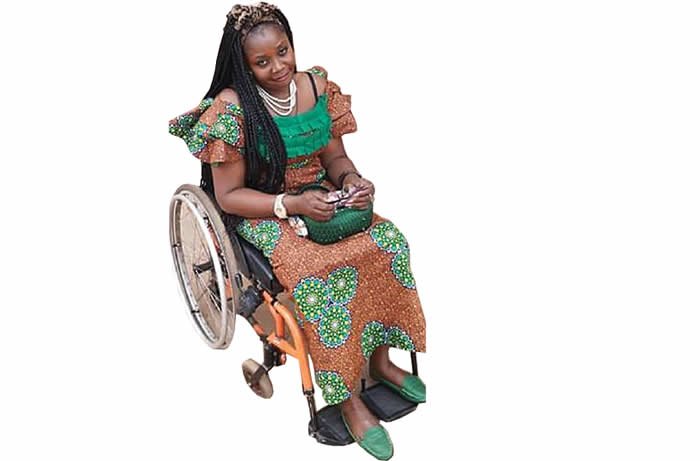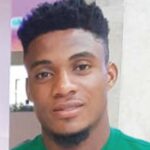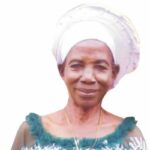
Gloria Mary Nwogbo, an Anambra-based teacher who sued a commercial airline, Dana Air, for allegedly preventing her from boarding due to her disability, tells ALEXANDER OKERE how the incident changed her and why Nigerians living with disabilities should be allowed to live their lives without social barriers
Please, introduce yourself.
My name is Miss Gloria Mary Nwogbo. I am in my early 40s. I am from Awka in Anambra State. I am an educator in a secondary school in Awka. I teach Biology. I am a graduate. I studied Biology in Science Education at Nnamdi Azikiwe University, Awka.
A civil society organisation, Disability Rights Protection Initiative, was reported to have sued a commercial airline on your behalf for allegedly discriminating against you on August 5, 2021. Can you confirm that?
Yes. I reached out to them because I had reached out to other CSOs that promised to help me get justice but unfortunately none of them was or has been able to fulfil that promise. But DRPI stood by me and promised they would assist me to get justice. They represent me.
Can you narrate what transpired between you and the airline?
I was supposed to travel on August 5, 2021. I was supposed to travel from Enugu State to Lagos. I had an appointment the following day and I needed to be in Lagos. I booked ahead. On getting to the airport, Dana Airlines (workers) told me I would not board because I am disabled and in a wheelchair. Of course, they said it was their protocol. They kept my load aside. That pissed me off and I wasn’t myself on that day. I missed the flight and could not meet up with the appointment. I was totally devastated because it wasn’t my first time travelling by air. I didn’t indicate that I have a disability because it’s not my first time travelling by air. It was indescribable, the humiliation was too much. I felt so bad and it caused me a lot of damage which I can’t describe now. They made me see myself as a nobody before my people and in my own country.
Did any of the workers make any derogatory statements against you?
The only thing I can remember is that they told me their protocol forbids persons in wheelchairs from travelling alone.
Were they polite?
Of course.
Did they reach out to you soon after the incident occurred?
No.
Was the money you paid as the cost of the flight refunded?
No.
Have they reached out to you in any way?
No. It makes me feel that they don’t care and that they did what they wanted to do. They wanted to show discrimination and it is not fair. I am a human being and they could have, at least, reached out (to me).
You said you had travelled with other airlines. What was your experience in those cases?
What happens is that when I get to the airport, the employees of the airlines assist me to board the aircraft and when I get to my destination, they help me to disembark.
You demanded the sum of N550m from the airline as damages for the alleged maltreatment you suffered…
Of course. I cannot begin to describe the loss I suffered. I have not faced this type of discrimination before in my life and that was why I felt bad. The airline should pay the N550m damages to serve as a deterrent to others.
Would you be open to an out-of-court settlement if the company reaches out to you?
The civil society group is handling the case and I believe it would bring it to a rightful conclusion.
In the suit filed before the Federal High Court in Enugu, you are also asking the court to declare as unconstitutional the airline’s terms and conditions on special passengers, which, according to the suit, states that passengers in a wheelchair and visually-impaired passengers cannot travel alone. Some may argue that you could have approached another airline if you were not comfortable with the terms. What’s your thought on that?
I have been travelling by air, though not with Dana Air. But the airline’s terms and conditions are not fair. This kind of thing can only happen in Nigeria. I remember one of my friends who has a disability travelled out of the country alone. He travels out to attend conferences and no one stops him. I don’t know why Dana has those terms and conditions because they could employ people to assist persons with disabilities to board and disembark. There is no big deal in that. This is something every company is supposed to put in place if things are done well. As of the time the incident occurred, my brothers were already waiting for me at the airport (in Lagos).
What can you tell me about your disability?
A disability could be acquired or congenital. In my case, it was acquired. I was a year old when I became sick, according to my mother. I was taken to a hospital but could no longer stand on my own after receiving an injection. But that was not what landed me in a wheelchair. Later in life, I had some issues in my legs and had to undergo surgery. I used to walk with crutches. But five years ago, I started having serious issues in my knees and femur (thigh bone) so I had to go for surgery, leading to the use of a wheelchair.
I didn’t find it funny when I was told I would have to use a wheelchair but all hope is not lost. According to the doctor, I will stop using the wheelchair when my knees and femur are properly healed. I know I have a big God who is capable of handling every situation. Despite the situation, I will rule my world.
Did you easily notice you were different from your peers in the neighbourhood in any way as a child?
I will tell you that I didn’t experience any difficulties because my family was there.
What kind of support did you get from your family?
Family is the first set of people that will treat you right. Other people would look at you and start treating you right. My family was there for me, despite the challenges I had. But I was faced with architectural barriers at school. The government has become aware of the need to address these barriers and it’s trying. For instance, in Awka, many public buildings have ramps to help people access the buildings. Also, in Anambra State, we have a disability rights law that speaks a lot for persons with disabilities in the state.
When I see persons with disabilities facing discrimination, I feel bad. Many members of the disability community have faced what I had to face at the airport that day. Even at school, many PLWDs do not have the courage to go to school because of these challenges and barriers. In the western world, PLWDs are given access to quality education in a way that would benefit them. That is because they are considered important there. But in Nigeria, it is different.
For example, I studied at Nnamdi Azikiwe University, Awka, and when I was an undergraduate, I suffered a lot. Sometimes, I had to remain downstairs while lectures were on because I could not access the lecture halls. At other times, boarding a commercial bus was a problem because I had to depend on people to carry me. We face a lot of barriers. Sometimes, getting married is a problem.
Did your condition affect your relationship with men?
In my case, I have not really experienced such but many of my friends have been affected. The parents of the man that proposed to one of my friends opposed the proposal. They said they would disown him if he didn’t leave the lady. His parents eventually disowned him because he insisted on getting married to the lady. The man stood by my friend and they achieved their goal. Things like that are what we face every day.
You speak passionately about the rights of PLWDs. Do you belong to any disability rights advocacy groups?
Yes, I am a member of different groups. They include Disabilities Rights and Protection Initiative, Joint National Association of Persons with Disabilities, Anambra State chapter; and Anambra State Persons with Physical Disabilities.
Following your recent experience at the airport, what is the best way to interact with persons with disabilities?
Society needs to know that persons living with disabilities, including those in wheelchairs, are part of that society. We have freedom as human beings and we are supposed to be treated as human beings. We need to love and be loved. But there is still discrimination out there. We know, though, that people in society do not look at us the way they used to. They used to think we were a group of beggars. But I’m thankful that I am not a beggar.
So, people in society have to stop discriminating against persons with disabilities. Among us are professors. Society should know we are humans and should treat us as such. I want to thank DRPI for assuring me that they would stand by me. They are keeping their word by making sure that justice is served. I also thank Punch (Newspapers) for being there. I pray that by God’s grace, justice will surely be served.
Copyright PUNCH.
All rights reserved. This material, and other digital content on this website, may not be reproduced, published, broadcast, rewritten or redistributed in whole or in part without prior express written permission from PUNCH.
Contact: [email protected]




